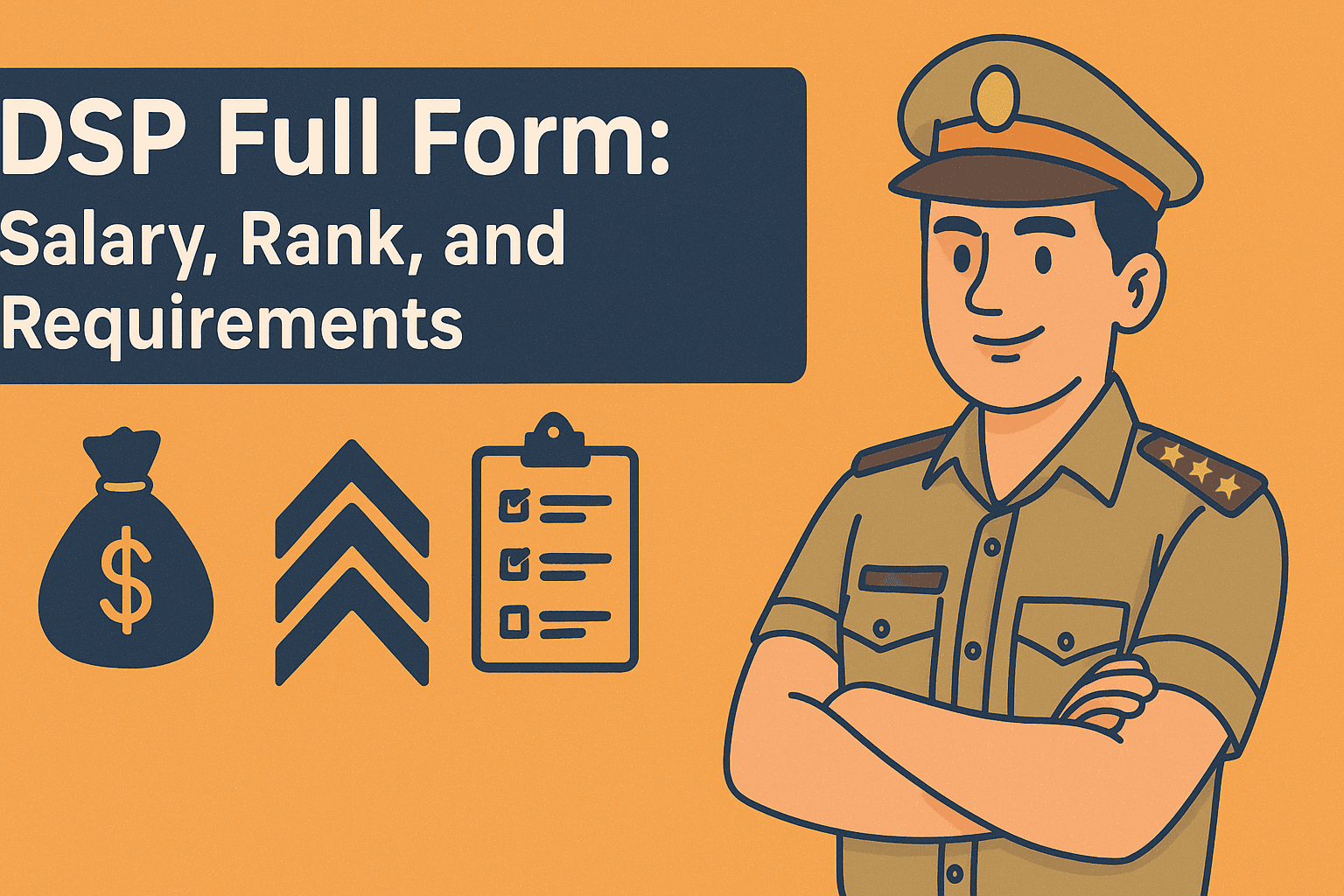India is the number one country with the highest population inside a third of the size of the USA. This is nothing to brag about, and this is a serious issue. Overpopulation is the leading cause of India for being underdeveloped, but that’s not the only issue. It eventually leads to issues like pollution, poverty, lack of affordable homes, and you know what? Those three things ultimately push a person towards crime. Yes, crime is definitely not a good thing, and when you are housing the world’s largest population, it becomes even harder to keep up with it.
To counter that, the Indian Police Service, or I can say the old Indian Police came up with new law enforcement positions to properly protect the citizens. We definitely have quite a lot of them, but today we will only focus on DSP. We will learn what is the dsp full form in police, how to become DSP, and how much salary they get paid at the end of the day.
DSP Full Form
DSP stands for Deputy Superintendent of Police, which was first assigned all the way back in 1876 as DySP or DSP. This role was exclusively for Indians, which was strategically put to counter the argument that the British only wanted Europeans to act as the higher-role officers. That’s why a similar role as the Assistant Superintendent (ASP) was introduced which is still being carried on to this day. But as always, DSP was the only highest position assigned to Indians, and anything above that was reserved for British personals only.
Although history doesn’t have any good deeds recorded for that role, this much is certain that the DSP full form emerged far before India was a country (technically) and it shows the evolution of the police force in India that took centuries to unfold.
How to Become DSP
Becoming a DSP is not an easy task, and in most cases, you have to either take an examination for it or get promoted from a lower position. So let’s see all the possible paths one by one and then you can decide which way makes the most sense to you:
- PSC Exam: The PSC or State Public Service Commission Exam is the most common way to get into this role. It has five stages:
- Preliminary which is an objective-type Written Exam.
- Mains which is a subjective-type Written Exam on things like general affairs, papers on law, and so on.
- Physical Efficiency Test or PET
- Medical Exam
- Interview
- Promotion: State-level police officers can get promoted to DSP. It has happened again and again, although the time required can vary.
- UPSC Exam: Some IPS officers may be designated as DSP for a short period. This is done towards their training period, and once over they will be back to their usual role.
DSP Salary In India
DSP salary mostly stays consistent among all states. Their role is significantly challenging, since they manage a big department of young outstanding police officers while also making sure to make monthly or even weekly reports to the SP. That’s why the government makes sure that the DSP salary is paid properly every time based on the Pay Level 10 matrix. So, here’s a simple breakdown of DSP salary across the five most popular states:
- DSP salary in MP: ₹56,100 per month.
- DSP salary in Telangana: ₹58,850 per month.
- DSP salary in Bihar: ₹53,100 per month.
- DSP salary in West Bengal: ₹56,100 per month.
- DSP salary in Tamil Nadu: ₹56,100 per month.
DSP Rank And Hierarchy
DSP is a highly respected role, so it is neither the lowest nor the highest. With that, it definitely has a lot of power only second to SP or Superintendent of Police. So these are all the rank breakdowns of DSP today:
- Lower Ranks:
- Inspector of Police or Police Inspector)
- Sub-Inspector of Police (SI)
- Assistant Sub-Inspector of Police (ASI)
- Head Constable (HC)
- Constable (CT)
- Equivalent Ranks:
- Assistant Superintendent of Police (ASP)
- Assistant Commissioner of Police (ACP)
- Higher Ranks:
- Additional Superintendent of Police ASP
- Superintendent of Police (SP)
- Senior Superintendent of Police (SSP)
- Deputy Inspector General of Police (DIG)
- Inspector General of Police (IGP)
- Additional Director General of Police (ADGP)
- Director General of Police (DGP)
Frequently Asked Questions
Q1. What is the DSP full form in police?
Ans. DSP is the short form of Deputy Superintendent of Police. In some states, it is known as Assistant Commissioner of Police or ACP for short and also as Circle Officer (CO) or Sub-Divisional Police Officer (SPDO). Anyways, the DSPs directly report to the SP or Superintendent of Police about what is going on in his department, provide reports, notify him of anything important, etc.
Q2. What is the SP salary in India?
Ans. sp salary or the salary of Superintendent of Police is around ₹78,800 to ₹2,09,200. This can also go up and down based on the commission matrix. Usually, the SP salary falls in the pay level 12, which is 2 ranks above the DSP salary which is pay level 10.
Q3. What is the DSP salary in Telangana?
Ans. The DSP salary in Telangana is around ₹58,850 – ₹1,37,050. Most states do not alter the basic pay that much, and the maximum we can see is a surplus or deficit of ₹3000 at most. So even if you work in some other state, there isn’t much that you are missing out on.
Q4. How is the DSP exam carried out?
Ans. There are fundamentally two stages in the DSP exam; the first one is the written part of the State Public Service Commission or PSC Exam, and the second one is the fitness or physical exam. Usually, the interview is conducted at the end for final inspection, and that’s it.
Q5. What is the DSP age requirement?
Ans. The age should be between 21 and 30 years. SC/ST and OBS category candidates can enjoy age relaxation, but as for our unfortunate general candidates, keep hanging on.











